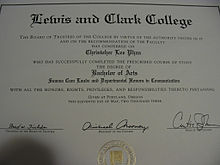 Bachelor of Arts (BA, B.A., AB or A.B.), from the Latin artium baccalaureus or baccalarium artium is a bachelor's degree awarded for an undergraduate course or program in either the liberal arts,
the sciences, or both. Bachelor of Arts degree programs generally take
three to four years depending on the country, academic institution, and
specific specializations, majors or minors. The word baccalaureus or baccalarium (from the Latin bacca, a berry, and laureus, "of the bay laurel") should not be confused with baccalaureatus (translatable as "gold-plated scepter" by using the Latin baculum and aureatus), which refers to the one- to two-year postgraduate Bachelor of Arts with Honours degree (Baccalaureatus in Artibus Cum Honore) in some countries.
Bachelor of Arts (BA, B.A., AB or A.B.), from the Latin artium baccalaureus or baccalarium artium is a bachelor's degree awarded for an undergraduate course or program in either the liberal arts,
the sciences, or both. Bachelor of Arts degree programs generally take
three to four years depending on the country, academic institution, and
specific specializations, majors or minors. The word baccalaureus or baccalarium (from the Latin bacca, a berry, and laureus, "of the bay laurel") should not be confused with baccalaureatus (translatable as "gold-plated scepter" by using the Latin baculum and aureatus), which refers to the one- to two-year postgraduate Bachelor of Arts with Honours degree (Baccalaureatus in Artibus Cum Honore) in some countries.In colleges and universities in Australia, New Zealand, Nepal and South Africa, the B.A. degree can be taken over three years of full-time study.Students must pursue at least one major area of study, and units from that subject are usually studied in each year, though sometimes students may choose to complete upper level classes in the same year and thus can leave space for elective subjects from a different field. At some universities students may choose to pursue a second major; alternatively, the remainder of the degree is taken up with a minor area of study (in the first two years) and other individual or stream-based subjects make up the degree. Unlike in other countries, students do not receive an overall grade for their Bachelor of Arts degree with varying levels of honours ("honours" is a distinction but not part of the degree itself). Qualified students may be admitted, after they have achieved their (general) Bachelor's program with a high overall grade point average, to a further one year Bachelor (with) Honours degree program ((with) Honours is part of the degree itself). Thus, to achieve a Bachelor (with) Honours degree (abbr. e.g. BA (Hons.) or BA hons.), an extra "postgraduate" year and a high research honour's thesis must be completed; see Honours Degrees. A student who holds a (with) Honours degree is eligible for direct entry to either a Doctorate (Ph.D.) or a very high research Master´s degree program.
In Germany, university-level education usually happens in either a Universität (plural: Universitäten) or a Fachhochschule (plural: Fachhochschulen); both can be referred to as a Hochschule, which is the generic term in Germany for all institutions awarding academic degrees. Fachhochschule is often translated as "University of Applied Sciences". Universitäten place greater emphasis on fundamental science and theoretical background, while Fachhochschulen are generally designed with a focus on teaching professional skills. Degrees earned at Universitäten and Fachhochschulen are legally equivalent.
In the United States, the Bachelor of Arts (B.A.) or Artium Baccalaureus (A.B.) is one of two basic undergraduate degrees. The other is the Bachelor of Science. At most institutions, the B.A. and B.S. have all but identical requirements with regard to the 120–128 semester hours or 180–192 quarter hours for a basic undergraduate degree. Curricula leading to the B.A., however, often require a certain minimum number of the total degree credits be drawn from coursework in topical areas historically associated with the liberal arts—such as language, literature, humanities, mathematics, history, museum studies, physical sciences, and social sciences. At Eastern Michigan University, for example, 75 of the minimum 124 credits must be earned in these subject areas—regardless of what the student may choose as a major or minor subject—including one year of study over two consecutive semesters of one foreign language. Until recently, many major universities in the United States required a student to complete a certain number of credit hours while attending campus-based courses. With the emergence of E-learning, residency requirements are losing popularity as educational institutions are expanding their ability to offer online degrees at all postsecondary education levels.










0 Comments:
Post a Comment